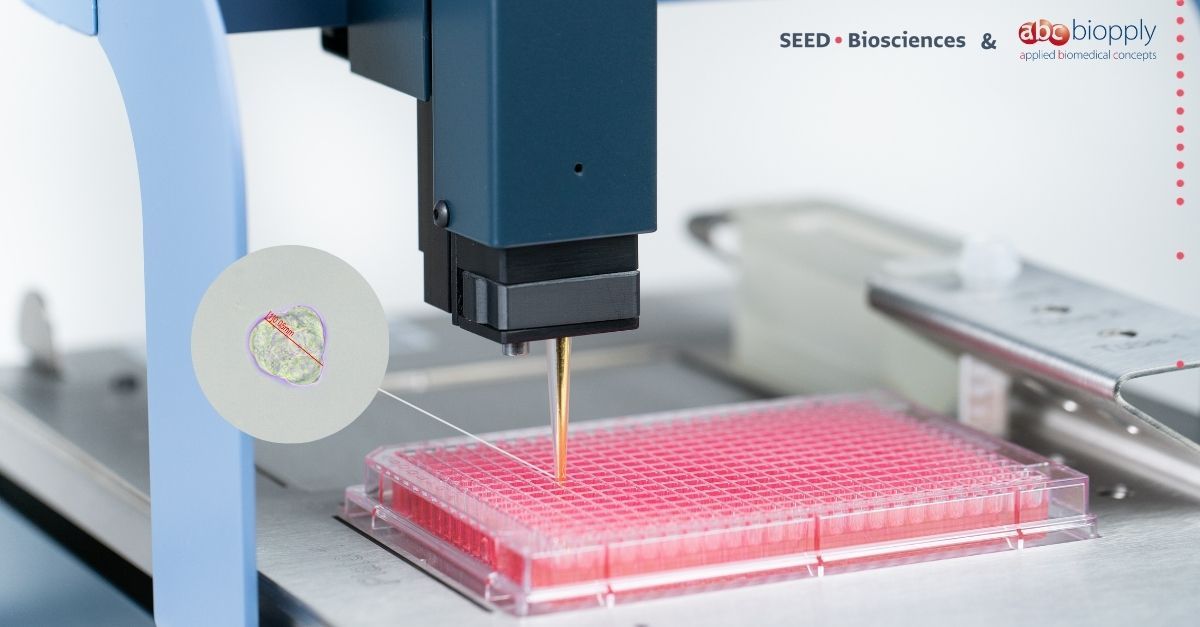abc biopply and SEED Biosciences collaborate on the automated individualization of highly homogenous and uniform spheroids
SEED Biosciences and abc biopply recently started a collaboration to develop highly homogeneous spheroids for high-throughput screening applications.
The companies’ combined expertise will allow the integration of 3D spheroid cultures in large-scale compound screening programs.
This approach will generate spheroids that more accurately reflect the physiological conditions of the cells, allowing more reliable preclinical test results.
abc biopply and SEED Biosciences have signed a letter of intent to collaborate on the separation and individualization of living spheroids for use in high-throughput screening (HTS) applications. By bringing together their specialized knowledge, the companies aim to tackle the challenge of growing uniform spheroids to allow more reliable large-scale 3D culture compound screening.
Growing highly homogenous and uniform spheroids is a prerequisite for the use of 3D cultures in HTS applications and has been one of the major hurdles preventing their integration in large-scale screening programs. With 3D CoSeedis™, abc biopply developed a novel and unique platform to produce large quantities of spheroids that fully meet these requirements. In addition, and contrary to conventional 3D platforms, the 3D CoSeedis™ system generates spheroids that resemble the in patients’ physiological conditions in terms of tissue structure and density. Their response to applied compounds consequently reflects the in vivo situation more accurately, leading to more reliable preclinical test results. Therefore, 3D CoSeedis™ provides 3D cultures not only in high enough numbers but also in unprecedented homogeneity and physiological accuracy.
‘I am confident that this innovative approach will allow the integration of 3D culture in large-scale screening programs, paving the way for more reliable and faster drug discovery,’ abc biopply’s COO Marco Leu says.
The key to successful HTS is having access to individualized spheroids in a multi-well format that feeds into highly standardized work processes, with no changes in the applied protocols. Individualization of cells into multi-well SBS-standard plates is SEED Biosciences’ speciality. The firm developed DISPENCELL, an automated pipetting robot designed to be compact and intuitive, and which enables rapid single-cell isolation with proof of clonality. Its unique technology guarantees gentle dispensing, which improves cell viability and cloning efficiency. DISPENCELL has been adopted in several applications, including cell line development, monoclonal antibody screening and CRISPR mediated gene editing. This new spheroid isolation represents a promising branch of application.
‘I am enthusiastic to join forces with abc biopply,’ SEED Biosciences CEO Georges Muller says. ‘I am convinced this collaboration holds great potential to explore new approaches for personalized medicine to benefit our life-sciences clients and patients in need of innovative new therapies.’
Under the agreement, abc biopply will provide highly standardized spheroids in large quantities and SEED Biosciences will adapt its current protocols to account for the dispensing of large-diameter living particles.
Both companies are convinced that the resulting system to individualize 3D cultures will help the transition of 3D culture into high-throughput and high-content compound screening and eventually lead to more predictive disease models in drug discovery.
About abc biopply
abc biopply is a contract research organization with its own specifically designed proprietary 3D cell culture platform 3D CoSeedis™. The company is specialized in advanced solutions for preclinical disease models and drug discovery. Since its foundation in 2018, abc biopply has pioneered a unique portfolio of 3D tissue imaging and analysis assays all based on the ground-breaking flexibility of our 3D CoSeedis ™ Co-Culture System, enabling the easy and reliable generation of quantitative datasets from tissues and cells.
About SEED Biosciences
SEED Biosciences is a spin-off from the Swiss Federal Institute of Technology (EPFL) and it developed DISPENCELL with the vision of democratizing the use of single cells in biology. DISPENCELL enables scientists to isolate single cell lines three times faster and at a cost 10 times lower than existing solutions. Its ambition is to set new standards in single-cell biology in order to accelerate the translation of precision medicine from research to personalized therapies to the benefit of patients.
For further information contact:
